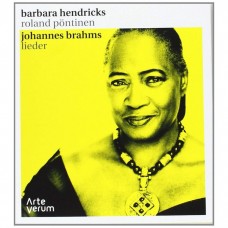芭芭拉.韓翠克絲 布拉姆斯歌曲集 Hendricks / Brahms: Lieder (Arte Verum)
Contrary to what one might think, the lied was not a kind of second-rate composition for Johannes Brahms (1833-1897). He composed more than 200 during his lifetime, with a surprising regularity in the production, mainly spread between 1851 and 1888. Unlike his master and friend Schumann or Wolf who had 'lieder years', the lied is therefore omnipresent in Brahms' musical production and often constitutes a complementary pole with his instrumental music, serving as a model for an atmosphere or a theme that he will take up later.
To choose his texts, Brahms is generally guided by the mood or message of a poem, more than by its formal perfection; this is probably the reason why he put Goethe to music, of which he said that the poems "are all so accomplished that we can not add music to them". Brahms preferred to put suggestive poetry to music, believing that the lied should have something to say, something that words alone were not enough to express. And while some composers use words to inspire music, Brahms uses them to create an atmosphere and often testifies to his own experience. Indeed, his favorite theme was of course love, in all its forms and thus evoking joy, optimism, but also nostalgia, loss, resignation, memory ... in a word: universal love. In these lieder we find deep symbols of lived feelings, authentic personal experiences of Johannes Brahms; Spread between romanticism and classicism, he gives in his lieder a personal music, incredibly pure and accomplished.
For years, Barbara Hendricks has been transmitting her love of lied, in concert and on record. After Schumann, Schubert, Beethoven, after the Spanish melodies and those of Poulenc, it is Brahms's turn to be sublimated in this Swedish soprano record, magnificently accompanied on the piano by his accomplice Roland Pontinen.
1.4 Lieder, Op. 96: No. 2, Wir Wandelten-3:00
2.5 Songs, Op. 72: No. 1, Alte Liebe-3:03
3.5 Lieder, Op. 107: No. 3, Das Madchen Spricht-1:20
4.5 Lieder, Op. 105: No. 2, Immer leiser wird mein Schlummer-3:29
5.9 Lieder and Songs, Op. 63: No. 5, Junge Liebe I -1:37
6.4 Songs, Op. 43: No. 1, Von Ewiger Liebe-4:58
7.4 Lieder, Op. 96: No. 1, Der Tod, das ist die Kuhle Nacht-3:14
8.5 Lieder, Op. 106: No. 1, Standchen-1:38
9.5 Lieder, Op. 107: No. 5, Madchenlied-1:38
10.5 Romances and Songs, Op. 84: No. 1, Sommerabend-2:04
11.5 Romances and Songs, Op. 84: No. 2, Der Kranz-1:50
12.6 Songs, Op. 3: No. 1, Liebestreu-2:32
13.7 Lieder, Op. 95: No. 4, Der Jager-1:13
14.8 Lieder and Songs, Op. 57: No. 1, Von Waldbekranzter Hohe-2:38
15.8 Lieder and Songs, Op. 57: No. 2, Wenn du nur Zuweilen Lachelst-1:34
16.8 Lieder and Songs, Op. 57: No. 3, Es Traumte mir-3:08
17.8 Lieder and Songs, Op. 57: No. 4, Ach, Wende Diesen Blick-1:59
18.8 Lieder and Songs, Op. 57: No. 8, Unbewegte Laue Luft-3:39
19.7 Lieder, Op. 48: No. 1, Der Ganz zum Liebchen-1:28
20.5 Romances and Songs, Op. 84: No. 4, Vergebliches Standchen-1:46
21.5 Lieder, Op. 105: No. 1, Wie Melodien Zeiht es mir-2:21
22.5 Lieder, Op. 107: No. 2, Salamander-0:59
23.8 Lieder and Songs, Op. 59: No. 5, Agnes-1:49
24.6 Lieder, Op. 86: No. 1, Therese-1:34
25.6 Lieder, Op. 86: No. 2, Feldeinsamkeit-3:04
26.5 Lieder, Op. 49: No. 4, Wiegenlied-1:47
27.5 Lieder, Op. 47: No. 1, Botschaft-2:02
編號 |
曲目 |
長度 |
作詞 |
作曲 |
演奏 |
樂團 |
演唱 |
指揮 |
試聽 |
|---|



